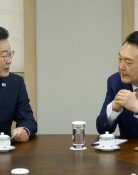Kang Jae-sup vs. Sohn Hak-kyu
In 1996, serious sentiment versus then President Kim Young-sam arose in Daegu ahead of the general elections for the 15th National Assembly. Only two of the then ruling New Korea Partys 13 candidates in Daegu won seats. Kang Jae-sup was one of the survivors. Sohn Hak-kyu, the incumbent chairman of the main opposition Democratic Party, ran in the April 2004 general elections for the Grand National Party and beat Cho Se-hyung, acting chairman of the National Congress for New Politics, in Gwangmyeong, Gyeonggi Province, causing a tremendous commotion. Kang, a prosecutor-turned-politician, and Sohn, a former professor, originally hailed from different fields but formed the group of next-generation leaders in the conservative Grand National Party for 14 years before Sohn defected to the liberal Democratic Party in 2007.
Kang served as spokesman of the Democratic Liberty Party in 1993 soon after the inauguration of the Kim Young-sam government, and demonstrated his trademark eloquence. Sohn was spokesman of the same party and the succeeding New Korea Party from 1995 to 1996. Kang served as chief secretary to the Democratic Liberty Party chairman under the Kim Young-sam administration, while Sohn briefly served as chief secretary to then Grand National Party Chairman Cho Soon from December 1997, soon after the party lost the presidential election that year.
Kang and Sohn started taking separate paths around the time the Grand National Party held an open competition to select its presidential candidate in 1997. Kang followed the new mainstream faction of the party, serving as political adviser to then presidential candidate Lee Hoi-chang. Sohn joined the anti-Lee faction in the open competition for the presidential candidate, and thus was put in an uncomfortable relationship with Lee. In 2002, Kang became a member of the partys supreme council to join the partys leadership, while Sohn won election as Gyeonggi governor. Afterwards, Kang became party chairman and managed the open competition for selecting the presidential candidate in July 2006, but Sohn blasted the process and bolted from the party, of which he had remained a member for 14 years, in March 2007. Kang decided not to run for the general elections and retired from politics to take responsibility for a fiasco in the nomination process of candidates for the 2008 general elections, the first year after the inauguration of the Lee Myung-bak administration.
Once Kang is confirmed as the ruling Grand National Partys candidate for the Bundang B district in Seongnam, Gyeonggi Province, in the April 27 by-elections, the two rivals must stage cutthroat competition to win. The election wherein the former ruling party chairman will face the main opposition leader will likely be highly interesting, but will also be extremely contentious and stressful to them. One of Kangs aides said, Former Chairman Kang has lived in Bundang for 15 years, while Sohn is a migrant. Sohns aide said, It is Kang that is taking the path of a migrant bird since he won four elections in Daegu alone but is about to run at the Bundang B district. The results of the election will likely determine their political fates and significantly change the power structures in the ruling and opposition parties.







